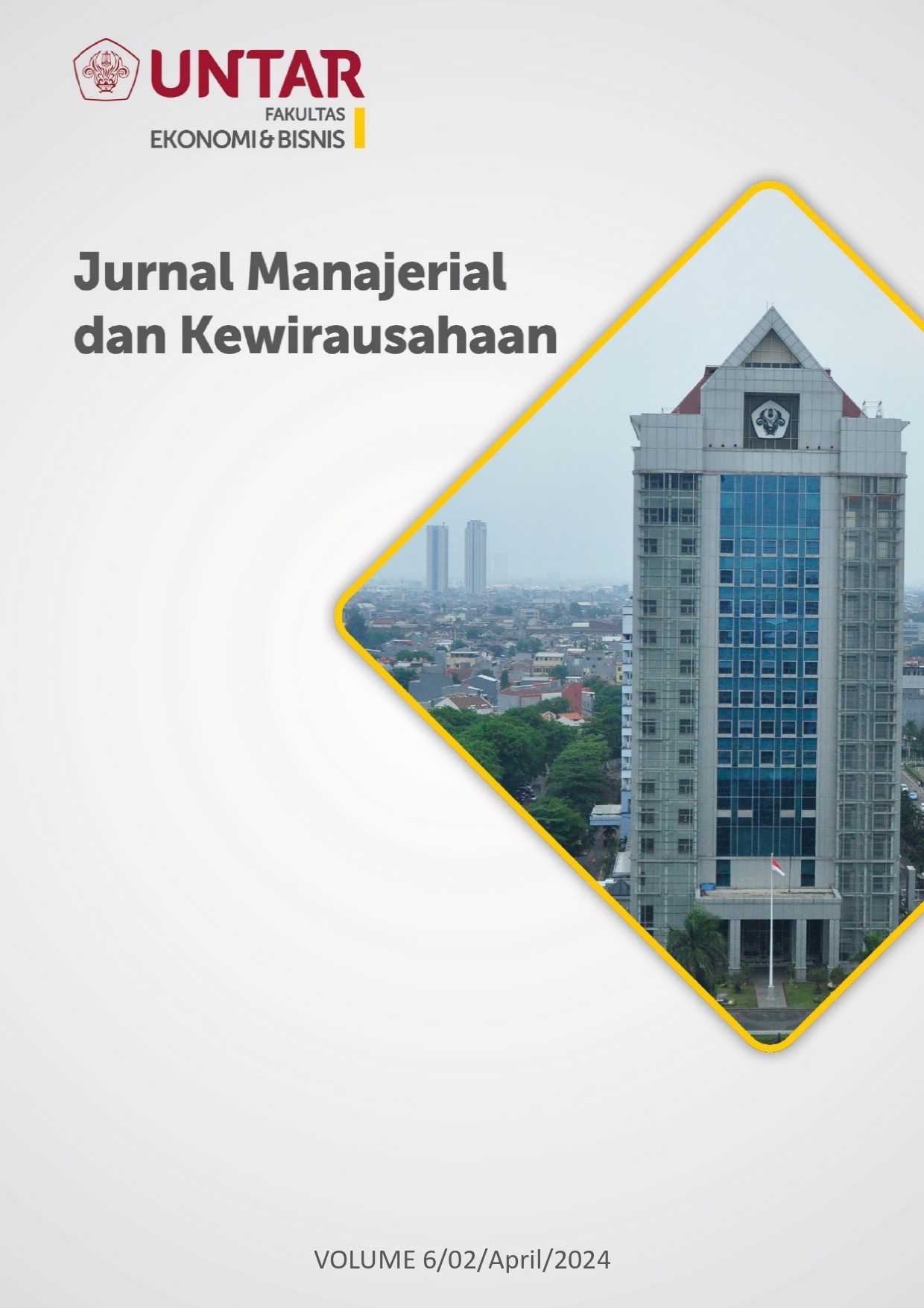E-Satisfaction Spotify pada Gen Z Jakarta Memengaruhi Repurchase Intention Melalui Enjoyment, Social Value, dan Ease of Use
Main Article Content
Abstract
Penelitian ini menggunakan metode deskriptif dengan design cross-sectional design. Data diperoleh melalui kuesioner yang disebar secara online dengan teknik non-probability sampling dan purposive sampling. Populasi dalam penelitian ini adalah generasi Z yang menggunakan aplikasi musik Spotify di Jakarta. Data dianalisis menggunakan SEM-PLS dengan software SmartPLS 4.0. Hasil penelitian menunjukkan bahwa perceived enjoyment memiliki efek negatif terhadap repurchase intention tetapi perceived social value memiliki efek positif yang signifikan terhadap repurchase intention. Perceived ease of use tidak berpengaruh signifikan terhadap repurchase intention tetapi e-satisfaction memiliki pengaruh positif dan signifikan terhadap repurchase intention. Perceived enjoyment dan perceived ease of use memiliki positif dan signifikan terhadap e-satisfaction tetapi perceived social value tidak memiliki pengaruh signifikan terhadap e-satisfaction. E-satisfaction mampu memediasi hubungan antara perceived enjoyment, perceived social value, dan perceived ease of use terhadap repurchase intention.
The aim of this research is to determine the influence of perceived enjoyment, perceived social value, and perceived ease of use on repurchase intention mediated by e-satisfaction for users of the Spotify music application in generation Z in Jakarta. This research uses a descriptive method with a cross-sectional design. Data was obtained through questionnaires distributed online using non-probability sampling and purposive sampling techniques. The population in this research is generation Z who uses the Spotify music application in Jakarta. Data were analyzed using SEM-PLS with SmartPLS 4.0 software. The research results show that perceived enjoyment has a negative effect on repurchase intention but perceived social value has a significant positive effect on repurchase intention. Perceived ease of use does not have a significant effect on repurchase intention, but e-satisfaction has a positive and significant effect on repurchase intention. Perceived enjoyment and perceived ease of use have a positive and significant impact on e-satisfaction, but perceived social value does not have a significant influence on e-satisfaction. E-satisfaction is able to mediate the relationship between perceived enjoyment, perceived social value, and perceived ease of use on repurchase intention.
Article Details
Section

This work is licensed under a Creative Commons Attribution-NonCommercial-ShareAlike 4.0 International License.
This work is licensed under a Jurnal Muara Ilmu Ekonomi dan Bisnis Creative Commons Attribution-ShareAlike 4.0 International License.,/p>
References
Anggelina, C. & Ruslim, T. S. (2023). Factor that Affects Repurchase Intention among Shopee Customers in West Jakarta (Satisfaction as A Mediator). International Journal of Application on Economics and Business, 1(3), 1694-1705. https://doi.org/10.24912/ijaeb.v1i3.1694-1705
Aurelia, F., & Nawawi, M. T. (2021). Pengaruh Customer Satisfaction, Perceived Value, dan Trust terhadap Online Repurchase Intention pada Fashion di Instagram di Jakarta. Jurnal Manajerial dan Kewirausahaan, 3(1), 117-126. https://doi.org/10.24912/jmk.v3i1.11296
Chiu, W., & Cho, H. (2021). E-Commerce Brand: The Effect of Perceived Brand Leadership on Consumers’ Satisfaction and Repurchase Intention on E-Commerce Websites. Asia Pacific Journal of Marketing and Logistics, 33(6), 1339-1362. https://doi.org/10.1108/APJML-10-2018-0403
Choi, E. J., & Kim, S. H. (2013). The study of the impact of perceived quality and value of social enterprises on customer satisfaction and re-purchase intention. International journal of smart home, 7(1), 239-252.
Cynthia, C. & Keni, K. (2023). Brand Experience, Perceived Value, and Social Media Marketing to Predicate Brand Loyalty. International Journal of Application on Economics and Business, 1(1), 402-408. https://doi.org/10.24912/ijaeb.v1i1.402-408
Damanik, M. A. A., Fauzi, A., & Situmorang, S. H. (2022). Pengaruh Perceived Usefulness, Perceived Enjoyment dan Kepercayaan Terhadap Continuance Intention Melalui Kepuasan Pada Generasi Millenial Pengguna E-Wallet di Kota Medan. Ekonomi, Keuangan, Investasi Dan Syariah 3(4), 827-834.
Guna, I. P. J. S. A. (2022). Pengaruh E-Service Quality Dan Perceived Value Terhadap E-Customer Loyalty Melalui E-Customer Satisfaction Pada Pengguna BNI Mobile Banking. Jurnal Riset Bisnis dan Investasi, 8(2).
Hair, J. F., Risher, J. J., Sarstedt, M., & Ringle, C. M. (2019). When to use and how to report the results of PLS-SEM. European business review, 31(1), 2-24.
Oktarini, M. A. S., & Wardana, I. M. (2018). Pengaruh Perceived Ease of Use dan Perceived Enjoyment terhadap Customer Satisfaction dan Repurchase Intention. INOBIS: Jurnal Inovasi Bisnis Dan Manajemen Indonesia, 1(2), 227-237.

